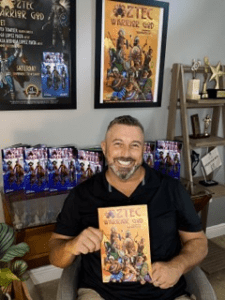Wednesday, May 31, 2023
#AuthorInterview with Verlin Darrow, author of Murder for Liar
Monday, May 29, 2023
#BookReview of Laban Learns Mindful Breathing by Sara Taher

Friday, May 26, 2023
#authorinterview with David Towner, author of The Spectacular Life of Benito Martin del Canto
Today, Feathered Quill reviewer Barbara Bamberger Scott is talking with David Towner, author of The Spectacular Life of Benito Martin del Canto.
FQ: Have you traveled to or maintained any personal ties to Spain, the setting for much of this work?
TOWNER: Yes. I was stationed in Spain briefly while in the military and subsequently have visited many times as a tourist. We continue to expand our time in Spain each time we visit and in the next few years, we plan to make our primary home somewhere in Andalusia.
FQ: Given your graphic novel background, do you envision this remarkable story as graphic, or film-ready, in nature?
TOWNER: Yes. I actually wrote the screenplay first and adapted it later as a novel. I envision a hybrid animation/live action film.
FQ: Can you briefly describe the research needed to piece together this complex, historically-based saga?

TOWNER: There were many elements that I had to research, and the collective process took over 5 years. Firstly, the story isn’t plausible unless the historic dialogue closely replicates Cervantes’ voice. I read nothing but his material for almost three years to get the cadence and vocabulary correct. I also had to make sure that the historic elements mirrored reality as well as the chronology of Cervantes’ life. I took several creative liberties with historical elements, such as implying that Don John of Austria, King Philip II’s half-brother, was the inspiration for Don Quixote. And although there are many hopeful conspiracies, there is no evidence that Cervantes and Shakespeare ever met, let alone had a personal relationship.
FQ: Do you see Cervantes as a saintly person - one whose miraculous life might, as you seem to indicate, provide substance for miracles among his readers?
TOWNER: Like many brilliant creators who are only recognized for their work posthumously, I think Cervantes was a mis-understood genius who was way ahead of his time. His work stands the test of time and has inspired millions. I think most writers and artist who believe in themselves can identify with a sense of being greater than their recognition. If Cervantes were born 400 years later, he would likely have been a global sensation by the time he was 30. Yet, he died penniless with a long history of incarcerations, rejections, and failures. That is really the underlying theme of the book. Benito is pleading for the world to recognize the gift of creators while they have access to them. Yet, he is also not deterred by the lack of recognition. Fortunately, artists are driven to create, with or without prosperity. But of course, a bit of acknowledgement can be quite inspiring.
FQ: Do you envision a sequel or series involving the book’s modern heroine, Taryn?
TOWNER: I have a series of short stories based on some of Benito’s magical experiences that I didn’t include in the novel. I think those could serve as a catalyst to an expanded second edition or perhaps, a follow up novel.
FQ: I’m intrigued by your film, Our Scripted Life, which was downloaded half a million times in the first three months. Wow! Would you tell our readers about this film?
TOWNER: I had a series of sketches built around a goofy hillbilly family and over the course of several years, I experimented with different ways to expand the sketches into a feature film. During that period, I also conceived a story about a low-budget soap opera actor who was secretly in love with his co-star who he believed to be an aristocrat from the UK. He decides to produce a low budget film to lure her into his world because “film actors always fall in love on set”. I decided to blend the two stories and one thing leads to another, and his love interest takes him home to meet her family. Not in London, as he expected, but in rural Kentucky. Fortunately, we finished the film in late 2019 and premiered it at TCL Chinese Theater 14 days before the Covid-19 pandemic. Once everything got shut down, we uploaded the film to Amazon and it was a hit. Not bad for an ultra-low budget, experimental film. I am very proud of that film and a true creative family was born as a result of it. I am still in touch with the entire cast and many of us have worked together since then.
FQ: I believe our readers would also love to learn about your popular graphic novel series, Aztec Warrior God. Please give us a little background on the series, how it started, and what makes it so popular.
TOWNER: I conceived the origin story in 2009 while visiting Mexico. Over the next several years, I developed the story to include indigenous people from around the world and the series included 24 novels. Due to the series’ very specific timeline, I had to release the first novel in August 2021. The pandemic also was a blessing for this project because the two top-tier artists I approached were on hiatus from their previous engagements and they agreed to help me. We created the art for the main character, Amoxtli, and I posted the art on a facebook page without much thought. Two weeks later, when I checked on the response, we had over 50,000 followers. Today, we have 21 million active readers, and our recently released animation has over 2 billion minutes streamed. I think the appeal to the series is multi-faceted. People love the indigenous representation and historical elements, the art is so high-quality, it could stand on its own, and people are ready for positive stories that focus on diplomacy, compassion and tolerance. Our characters are traditional superheroes, but they always approach conflict with diplomacy, using violence as a last resort.
FQ: I worked in a college physics department for almost 30 years. Please tell me about your theoretical physics background! What did you study? Where? Any interesting papers I could look up?
TOWNER: I remain fascinated by Physics and if you read the Aztec series, you will see many familiar references including multiple theories and even appearances by Stephen Hawking and Neil DeGrasse Tyson. I studied Physics while still in the military but never pursued it as a career since most of the opportunities were in academia and required a PhD, which never appealed to me as a young person. Academically, I am quite a contradiction. I have undergrads in Criminal Justice, Physics, and Marketing. I also have 30-40 credit hours of electives that were not applicable to any of my majors. I blame my thirst for knowledge and my ADHD.
FQ: I also see that you're a fan of Dinosaur Jr. It's certainly a small world as I lived a few houses away from one of their leads, Jay Mascis. His family and ours were good friends.
TOWNER: I consider J Mascis as brilliant as Miguel Cervantes. Way ahead of his time and not nearly as recognized as he should be. He is responsible for some of the most incredible guitar riffs (and entire songs) in history. Dinosaur Jr. should be playing extended engagements in sold-out stadiums but the last time I saw them, there may have been 800 people in the audience (mostly 40+ guys like me). Yet, three chord country artists or rap stars who can’t even write music, get to perform in front of 100,000 people. This is the bane of an artist’s existence.









